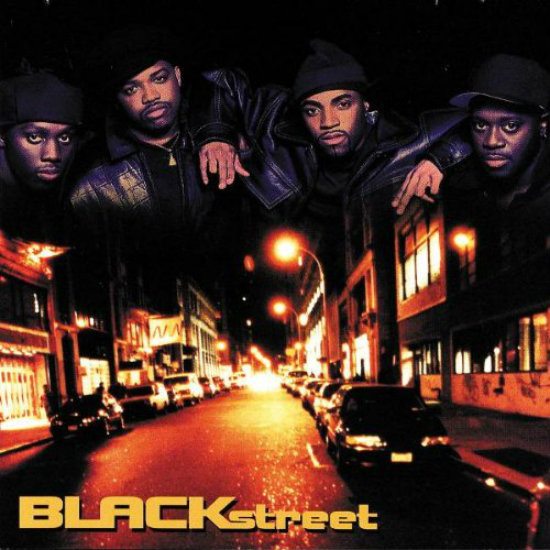
During the “Intro (Blackstreet Philosophy)” on their debut album, Blackstreet sets the bar high by declaring that they are “trendsetters, life changers [and] role models for the kids.” And when they first burst onto the scene with their self-titled debut album, the quartet seemed destined to reach their aspirations thanks to their edgy R&B sound and tight harmonies. Unfortunately for the members, the group’s goal would be marred by a revolving door of members and competing egos.
Things were looking much more optimistic for the guys when Blackstreet was first conceived in 1991 by Chauncey Hannibal and producer Teddy Riley, who decided to start a new group following the breakup of his previous group, Guy. Initially, they tapped Levi Little and Joseph Stonestreet to round out the new quartet. However, Stonestreet was replaced by Dave Hollister before they would even drop their debut self-titled CD.
Despite the early lineup change, when Blackstreet made its debut in June 1994, success came quickly, driven mostly by the album’s first top 20 single, “Booti Call.” Co-produced by EPMD’s Erick Sermon, the song relied heavily on George Clinton’s 1982 hit “Atomic Dog” and Zapp’s 1983 hit “Heartbreaker.” The result was pure magic as Blackstreet danced, bumped and chased the proverbial cat right on up the music charts, peaking in the top 20 on three Billboard charts and climbing to the No. 34 spot on the Hot 100 chart. Even with Sermon’s hand in co-production, the song was still pure Riley, possessing the same hip-hop tinged R&B that he had come to be known for. Additionally, the song introduced the term “booty call” into the popular culture.
“Booti Call” technically wasn’t the group’s first single, however. That honor went to “Baby Be Mine,” which was recorded in 1992 and released in 1993 as part of the official movie soundtrack for CB4. The song also holds the distinction of being the only Blackstreet song to feature the group’s original lineup, with the departed Stonestreet co-writing the track with Riley in addition to providing the lead vocals. Despite this minor detail, the uptempo number still was included when Blackstreet made its bow more than a year later.
The album’s next single, “Before I Let You Go,” would prove that Blackstreet was equally as adept at slowing things down as they were at getting you to the dance floor. The ballad would be the highest charting song from the album. The ballad went on to climb to the No. 7 spot on the Hot 100 chart and No. 2 on the Hot R&B Singles chart. The song and its accompanying video would serve as the world’s official introduction to Dave Hollister, who had replaced Stonestreet after he parted ways with the group. Music fans were instantly hooked by Hollister’s soulful tenor and the song’s tender lyrics.
Dave Hollister wouldn’t be the only rising star to make his debut on this album. Riley enlisted the help of two then-unknown talents that he had been mentoring named Pharrell Williams and Chad Hugo, or The Neptunes as they would come to be known years later. Blackstreet would provide the duo with some of their first album credits as the co-writers and assistant producers on the album’s fifth and final single, “Tonight’s the Night” and with Hugo also playing saxophone on “Happy Home.” Of course, following such humble beginnings, The Neptunes would go on to become one of the most successful production teams of the 1990s and 2000s.
There was one big name artist who quietly played a part in one of the album’s most endearing songs. “Joy,” the fourth single to be released from Blackstreet featured the creative assistance of one of music’s biggest stars, Michael Jackson. Riley had initially intended to use the song for Jackson’s 1991 album Dangerous and had even had MJ work on the song’s composition. However as fate would have it, “Joy” never was used by Jackson and instead was recorded by Blackstreet, providing the group with their fourth chart-climbing single. Although it was a little known fact at the time, Jackson’s touch could be heard in the harmonies of the ballad penned with Riley’s daughter in mind. While only a snippet of Jackson’s has been heard thus far, Riley revealed in an interview that he still owns the master version recorded by Jackson.
- Advertisement -With the success of their platinum selling debut under their belt, it would seem that Blackstreet would be destined for the lengthy careers and chart-topping success that so many aspiring artists crave. However, by the time the follow-up album, 1996’s Another Level, was released, both Little and Hollister had left the group, getting replaced by new members Eric Williams and Mark Middleton. By the time their third album, Finally, was released in 1999, Middleton had been replaced Terrell Phillips. The revolving door would continue, with Hannibal and Riley publicly falling out then reuniting along with Hollister and Middleton to record the group’s fourth and final studio album, 2003’s Level II. The beef between Riley and Hannibal would rear its ugly head again, with Hannibal coming out on top by owning the trademark rights to the group’s name. Currently, he along with Little, Middleton and Williams continue to perform under the Blackstreet name.
The drama that unfolded between the group’s members would subsequently temper Blackstreet’s meteoric rise to the top. But lucky for music fans, we were blessed with this stellar debut that continues to provide a perfect snapshot of the talent that prevailed in music at the time.
- Advertisement -Blackstreet Blackstreet [Amazon][iTunes][Google Play][Spotify]


